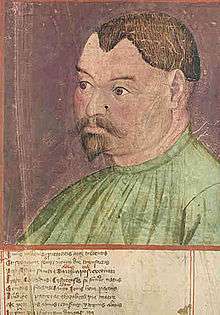Konrad Kyeser

Konrad Kyeser (26 August 1366 – after 1405) was a German military engineer, author of Bellifortis (c. 1405), a book on military technology popular throughout the 15th century. Originally conceived for King Wenceslaus, Kyeser dedicated the finished work to Rupert of Germany.
Kyeser, a native of Eichstätt, was trained as a physician and lived at the court in Padua before he joined the crusade against the Turks which ended in disaster at the Battle of Nicopolis of 1396. Kyeser was in exile in a mountain village of Bohemia during the reign of Sigismund in 1402 to 1403.
Bellifortis
.jpg)

In this time, he began to write his book on the military arts. The book is the most prominent illustrated treatise on military engineering of the Late Middle Ages. There are at least twelve surviving 15th-century manuscripts which copy, excerpt or amplify the work. One of these is the Thott Fechtbuch of Hans Talhoffer (1459).
The book is divided into ten chapters, but there are also issues with the full content divided into 7 chapers:
- cars
- siege engines
- hydraulic engines
- elevators
- firearms
- defensive arms
- wondrous secrets
- fireworks for warfare
- fireworks for pleasure
- auxiliary tools
The diving suit presented in the book has precedents reaching back to the 12th century and to Roger Bacon. The book also has the earliest known depiction of a chastity belt. Kyeser counts the artes magicae among the mechanical arts, and his work contains various applications of magic in warfare.
Editions
The original codex is kept in the Göttingen University library (Cod. Ms. philos. 63). These are other editions:
- Götz Quarg (ed.), facsimile of the Göttinger MS Philos. 63, VDI-Verlag, Düsseldorf (1967)
- Udo Friedrich (introduction), Fidel Rädle (trans.), Bellifortis, Codices figurati - libri picturati, Lengenfelder, Munich (1995), ISBN 3-89219-303-7. (facsimile of Cod. Ms. philos. 64 und 64a Cim.)
- electronic edition (CD ROM), facsimile of Cod. Pal. lat. 1994, Palatina manuscripts of the 12th - 15th centuries, Belser, Wildberg (2001)
See also
Literature
- L. White, Kyeser's "Bellifortis": The First Technological Treatise of the Fifteenth Century, Technology and Culture (1969).
Further reading
- Boehm, Barbara Drake; et al. (2005). Prague: The Crown of Bohemia, 1347-1437. New York: The Metropolitan Museum of Art. ISBN 1588391612.
External links
| Wikimedia Commons has media related to Bellifortis. |
- Bellifortis - complete digitized version
- http://www.ingolstadt.de/stadtmuseum/documents/ast_2003_konrad_kyeser_mi.htm
- http://aeiou.iicm.tugraz.at/aeiou.history.id_ko.i11.i5